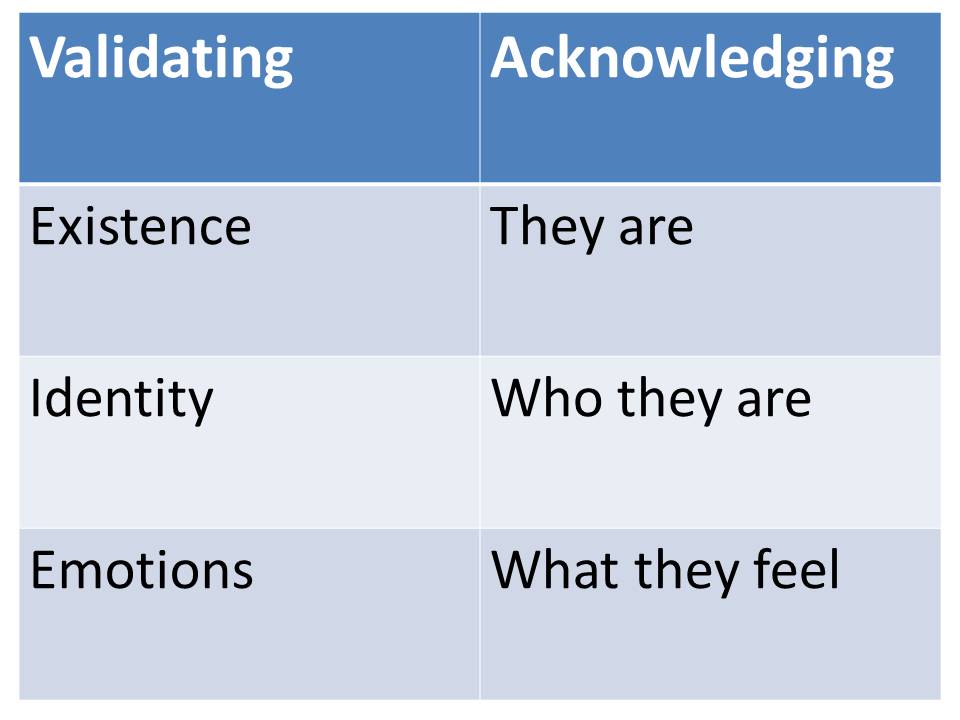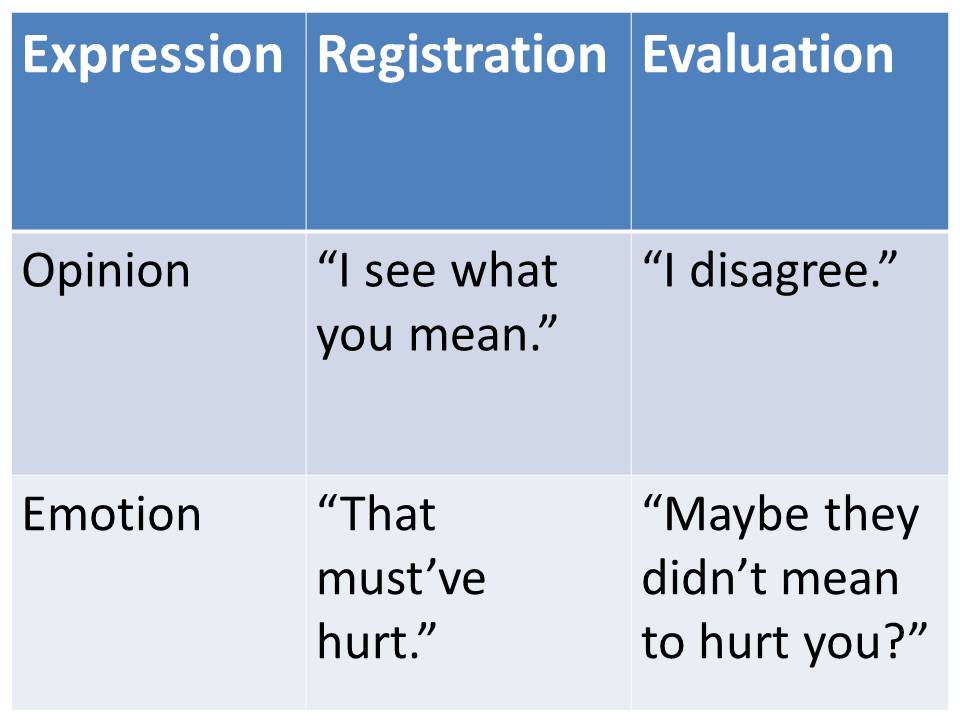Humans are ultra-social species who crave validation from each other. Social validation is the glue that keeps human relationships together. Put simply, being validated means being acknowledged, and being invalided means being dismissed.
Before we can discuss how to validate someone, it’s important to realize that humans seek validation in several areas. Most experts focus only on emotional validation, but that’s just one, albeit important, area that people seek validation in.

People also seek to validate their identity, beliefs, opinions, values, attitudes, and even existence. The need to validate one’s existence is perhaps the most basic and raw of all the human validation needs.
When you validate someone’s existence, by talking to them for example, you acknowledge they exist. They’re like:
“I exist. I’m a person. Others can interact with me.”
Existential validation plays a big part in keeping people sane. It kills people when they can’t validate their existence.
For example, people who go for long periods of time without interacting with anyone risk losing their sense of existence. This is why solitary confinement is the worst kind of punishment.
Validating identity
After you’ve acknowledged that the person exists, the next key area of validation is identity. Validating someone’s identity is acknowledging who they are. This is often based on what they project themselves to be.
People have a strong need to be socially accepted. So they often project an identity they believe will be most accepted by their tribe. When you acknowledge who they’re projecting themselves to be, it gives them immense satisfaction.
Beliefs, attitudes, opinions, and values-all comprise our identity. Therefore, validating any of these is part of validating one’s identity.

The two levels of validation
To keep things simple, I devised my own, easy-to-remember two-level validation model. Social validation can occur on two levels:
- Registration
- Evaluation
1. Registration
It simply means you register in your mind the information emanating from the other person, even if that information is as basic as “They exist”.
When you register or acknowledge what the other person is sharing with you, you’ve validated them. This is the minimum and sufficient requirement for social validation.
For example, in conversations, effective registration could take the shape of paying your full attention to them. You can’t register the information they’re sharing if you’re distracted. Hence, not paying your full attention to them makes them feel invalidated.
For effective registration to occur, you have to let them share effectively. This is where many people struggle. You have to let the other person express fully, so you can register fully, and, thereby, validate them fully.
If you’re blocking their expression, you won’t register what they have to offer, making them feel invalidated.
Think about the common complaint women have in relationships:
“He doesn’t listen to me.”
What they’re saying is that their partner is blocking their expression, say by giving advice or a solution. When their expression is blocked, they feel invalidated, even if the solution offered is effective.
By offering a solution, men cut short women’s emotional expression. They don’t realize that when women share problems, they’re mostly looking for validation.
Of course, solutions are important. But they have to follow registration, which brings us to the next level of validation:
2. Evaluation
Evaluation of the information the other person is sharing is the next level of validation. Of course, before you can evaluate something, you have to register it in your mind first.
When evaluation happens during registration, it short-circuits expression, making the other person feel they’re not given space to express themselves fully.
We can use evaluation for validating a person further. For example, agreeing with them, empathizing with them, liking what they shared, etc. are all positive evaluations that validate them further.
At this stage, you’ve processed the information they shared with you and are offering your take on it. At this point, agreeing or not agreeing doesn’t matter that much since the other person already feels some basic validation. But if you do agree, you validate them further.
If you disagree or dislike what they shared (negative evaluation) before properly registering what they shared, you only end up irritating and invalidating them. Not a socially smart thing to do. Always keep the registration-evaluation sequence in mind.

Validating emotions
You can’t always relate to what others are sharing. They tell you that something happened that made them feel a certain way, and you’re like:
“Why’s he so sensitive?”
“Why’s she being a drama queen?”
That’s negative evaluation! If you don’t care about the person, go right ahead, evaluate them negatively. Throw your judgements on them. But if you care about them and want to validate them, steer clear of such knee-jerk evaluations.
Now, avoiding evaluations is hard when you can’t relate to what they’re sharing. Thing is, you don’t have to. If you can, that’s great. You’re positively evaluating their information and reflecting it back to them. You’re empathizing.
That’s the higher level of validation, but you don’t need it. Registration is all you have to do to provide the basic level of validation to someone.
“I understand how you feel.” (Do you though?)
Say your best friend is going through a tough time and they share their feelings with you. You say:
“I understand how you feel.”
If you’ve never experienced anything close to what they have, they’ll think you’re lying or being insincerely polite. You’d appear fake to them.
Instead, when you can’t really relate to how they’re feeling, you can simply say:
“That must have felt horrible.”
You’re not claiming you understand, but you’re registering their experience in your mind (validation!) and only inferring their feelings.
Again, empathy and being able to relate isn’t required for validation. Just show them you’ve registered what they’re trying to communicate. Empathy, if possible, is the cherry on top of the cake of social validation.
Emotional validation largely comes down to how in touch a person is with their own emotions. People who’re in touch with their own emotions can better validate the emotions of others.
They understand emotions have their own value, irrespective of how they arise. They understand emotions need to be explored, not dismissed.
Putting it all together
Say your spouse comes up to you and tells you about this new business idea they’re super excited about. You register their idea, think it’s exciting, and reflect your own excitement (positive evaluation), saying:
“This is really exciting!”
Congrats! You just validated them to the extreme.
If you listen to their idea and think it is stupid, you might say:
“What a stupid idea!”
You might hurt them, yes, but you haven’t invalidated them. You’re showing that you registered their idea and think it is stupid (negative evaluation). You moved from the registration stage to the evaluation stage.
Now, let’s say while they were talking about the idea excitedly, you cut them short, sarcastically saying:
“You and your business ideas!”
You just invalidated them. They’re going to be pissed that you didn’t even listen (register) to their idea before you threw your evaluation bomb to decimate their expression.
Can you see how invalidation is worse than negative evaluation?
Now, think about the effect a positive evaluation would have when it’s used to cut short expression.
Say you’re expressing your exciting idea and they cut you short, saying:
“That’s a great idea!”
Even if they weren’t lying and, based on what little they heard, thought it was a good idea, you’re likely to think they’re lying or being dismissive. You feel invalidated, despite the positive evaluation.
It’s hard for you to believe that they liked your idea because they didn’t even take the time to register it.
This has happened to me on several occasions.
For example, I come across a cool classical piece on YouTube and share it with a friend. Even though the piece is about 4 minutes long, 10 seconds after I send it to them, they’re like:
“Great song!”
Of course, 10 seconds isn’t enough to register the greatness of a piece of classical music 4 minutes long. It not only makes me feel invalidated, but raises a red flag in my mind.
They come across as fake, dishonest, and wanting to please. I lose a bit of respect for them.
Instead, had they said something like:
“Look, man. I’m not into classical music. Stop sending me this stuff.”
I would’ve felt a bit validated because they at least paid enough attention to it to figure out it’s classical music. They followed the registration-evaluation sequence properly. Also, they gain my respect for being honest.
